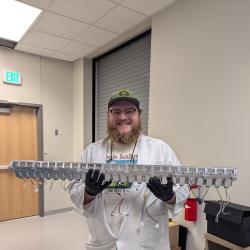NSF Graduate Research Fellowships Awarded to 17 Science Terps
Seventeen current students and recent alumni of the University of Maryland’s College of Computer, Mathematical, and Natural Sciences (CMNS) received prestigious National Science Foundation (NSF) Graduate Research Fellowships, which recognize outstanding graduate students in science, technology, engineering, and mathematics.
“I’m so happy to see our students honored with prestigious NSF Graduate Research Fellowships that acknowledge their hard work in their research endeavors and in the classroom,” said CMNS Dean Amitabh Varshney.
Across the university, 29 undergraduates and recent alumni were among the fellowship winners announced by the NSF. As a result, UMD ranks ninth in the nation and second in the Big Ten for the number of fellows who received their bachelor’s degrees at the university.
The college’s 17 awardees include eight current undergraduates with CMNS majors, three recent alumni who received bachelor’s degrees in CMNS majors, and six current graduate students enrolled in CMNS programs (one of whom is also a recent graduate).
CMNS graduate student fellowship recipients:
- Makana Castillo-Martin, computer science graduate student
- Jason Fan, computer science graduate student
- Max Ferlauto, entomology graduate student
- Nicholas Franzese, computer science graduate student
- Lillian Huang, computer science graduate student
- Katie Reding (B.S. ’15, biological sciences), entomology graduate student
CMNS undergraduate student fellowship recipients:
- Anna Grafov, physics major
- Caleb Harada, astronomy and physics dual-degree student
- Michael Nastac, physics and mathematics dual-degree student
- William Nguyen, geology major
- Nicholas Poniatowski, physics major
- Caitlyn Singam, biological sciences major
- Tanay Wakhare, mathematics and computer science dual-degree student
- Mark Zic, physics major
CMNS alumni fellowship recipients:
- Lily Durkee (B.S. ’18, biological sciences)
- Deiaa Harraz (B.S. ’18, chemistry; B.S. ’18, chemical engineering)
- John Martyn (B.S. ’19, physics)
NSF fellows receive three years of support, including a $34,000 annual stipend, a $12,000 cost-of-education allowance to the graduate degree-granting institution, international research and professional development opportunities, and access to a supercomputer.
The NSF Graduate Research Fellowship Program helps ensure the vitality of the human resource base of science and engineering in the United States and reinforces its diversity. The program recognizes and supports outstanding graduate students in NSF-supported science, technology, engineering, and mathematics disciplines who are pursuing research-based master’s and doctoral degrees at accredited U.S. institutions.
Since 1952, NSF has funded more than 50,000 Graduate Research Fellowships out of more than 500,000 applicants. Currently, 42 fellows have gone on to become Nobel laureates, and more than 450 have become members of the National Academy of Sciences.
###
Media Relations Contact: Abby Robinson, 301-405-5845, abbyr@umd.edu
University of Maryland
College of Computer, Mathematical, and Natural Sciences
2300 Symons Hall
College Park, MD 20742
www.cmns.umd.edu
@UMDscience
About the College of Computer, Mathematical, and Natural Sciences
The College of Computer, Mathematical, and Natural Sciences at the University of Maryland educates more than 9,000 future scientific leaders in its undergraduate and graduate programs each year. The college's 10 departments and more than a dozen interdisciplinary research centers foster scientific discovery with annual sponsored research funding exceeding $175 million.








